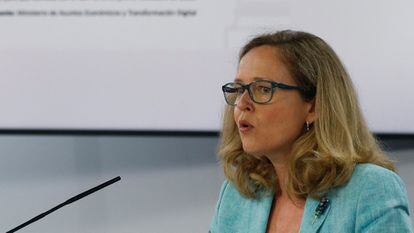Spanish economy forecast to bounce back to pre-pandemic levels in 2022
Spain will also experience the biggest economic expansion of advanced nations next year, but it comes on the back of a record decline of nearly 11% in 2020 due to the coronavirus pandemic
/cloudfront-eu-central-1.images.arcpublishing.com/prisa/M3BRV5LYFRNHJBB6OKPCZ3TRAQ.jpg)
The Spanish government on Tuesday confirmed its economic growth forecast for this year and the next, based on the pace of recovery following the end of most coronavirus mobility restrictions and the good pace of the Covid-19 vaccination drive.
The Cabinet said that gross domestic product (GDP) will grow 6.5% in 2021 and 7% in 2022, in line with previous forecasts. “In 2022, Spain will recover its pre-pandemic activity and in 2023, it will return to the path of growth we had before the health crisis,” said Economy Minister Nadia Calviño of the Socialist Party (PSOE), which leads a coalition government with the leftist Unidas Podemos.
The International Monetary Fund (IMF) is a little less optimistic. In its latest World Economic Outlook report, the international organization has shaved two tenths of a point off its April growth forecast for Spain, now set at 6.2% for 2021. For next year, the forecast is now 5.8%, up from 4.7% in April.
This makes Spain the advanced economy that will expand the most in 2022 after suffering the biggest setback in 2020, when output fell by a record 10.8%, the biggest decline since the Spanish Civil War.
The IMF’s figures are more in line with the European Commission, which is forecasting growth of 6.2% in 2021 and 6.3% in 2022. The IMF’s projected growth for Spain in 2022 is significantly higher than for Germany (4.1%), France (4.2%) and Italy (4.2%), but because the Spanish economy shrank so much more last year, it will return to pre-pandemic levels later than France and Germany, although earlier than Italy.
Economic plans in Spain

Following the Tuesday Cabinet meeting, Economy Minister Nadia Calviño said that after the summer she will consider raising the minimum wage, depending on the evolution of the labor market. The minister underscored the market’s progress in recent months, particularly in June when the jobless rate fell by a record amount and nearly 235,000 workers were added to the Social Security system. “This summer we could go back to employment levels similar to those before the pandemic,” she said. But it is still unclear whether many of the workers who remain on the government’s ERTE job retention scheme will be laid off in the fall, along with workers in the tourism industry who were hired for the summer season.
With a view to drafting next year’s budget, the Cabinet also capped the 2022 spending ceiling at €196.1 billion, a 0.02% rise from the previous year and the highest on record. Last year, the executive raised the limit on spending by 53% in order to cover extraordinary expenses derived from the coronavirus pandemic, including the ERTE scheme, financial aid for small businesses and transfers to local and regional governments to help them with health and education measures.
The €196.1 billion includes €26.4 billion from the EU recovery fund, and Brussels will demand reforms in exchange for that amount. Also included are transfers to regional governments worth €18.4 billion, a 32.1% rise from last year.
The Cabinet also addressed the public deficit, which last year soared to represent 11% of GDP or around €125 billion. Finance Minister María Jesús Montero said the government is hoping to bring this down to 8.4% in 2021 and 5% in 2022. If so, it would be Spain’s greatest feat of fiscal consolidation in its entire democratic history. But there is a catch: the reduction would be due to a larger denominator (the GDP figure) rather than a smaller numerator (through cuts to spending or increased tax revenues.)
Spain may also get a break from the European Commission, which has proposed to suspend deficit and debt rules for all member states in 2022 - just like in 2020 and 2021 – until next year, when economies are expected to rebound.
The government said that the 2022 accounts will shore up its short-term strategy to keep supporting the recovery effort, and in the medium and long term to transform and modernize the Spanish economy to make it more sustainable and resilient.
English version by Susana Urra.
More information
/cloudfront-eu-central-1.images.arcpublishing.com/prisa/PIF4WKEMDNH5LHFNTLDDNB3ZRE.jpg)
/cloudfront-eu-central-1.images.arcpublishing.com/prisa/TEZ2OHRNBFCAZ7URYY3NLOGWSE.jpg)










































